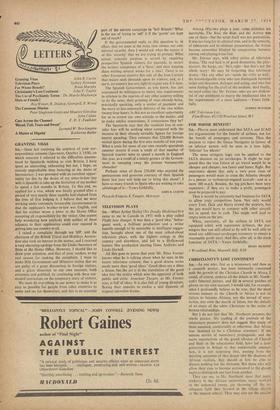CHRISTIANITY'S LOST CONTINENT
SIR,—As one who, first as a missionary and then as a research worker, has been intimately concerned with the growth of the Christian Church in Africa, I could, of course, endorse all the details in Mr. North- cott's funereal picture, and fill in several patches of gloom on my own account. I would add, for example, what I profoundly believe to be true, that the most serious menace to the Church in Africa is not its failure to become African, nor the inroad of secu- larism, nor even the march of Islam, but the default of so many of the white Christians in the realm of human relationships.
But I do not feel that Mr. Northcott presents the whole picture. My reading of the journals of the missionary pioneers does not suggest that many of them assumed, comfortably or otherwise, that Africa was 'destined to be a Christian continent.' If the success stories of missionary propaganda, and the naive expectations of the grand alliance of Church and State in the educational field, have led a later generation in Britain to that comfortable assump- tion, it is not surprising that, passing from the dazzling optimism of that dream into the shadows of African realities, they should at first be able to discern nothing but the darkness. But those who will allow their eyes to become accustomed to the gloom begin to distinguish one fact from another.
They can sec, as. Mr. Northcott does, that many students in the African universities, many workers in the industrial towns, are throwing off the in- adequate faith they learned in the village church or the mission school. They may also see the smaller number who have wrestled their way into a Christian confidence which has come to terms with their new world. It is possible to see here 'the most potent sign that Christianity may lose Africa' or an equally potent sign that it may win her. In the rise of Mau Mau one can iee with Mr. Northcott how thin was the Christian veneer upon the majority of adherents, but one can also see how unshakable, beyond all expectation, was the faith and the charity of a minority of several thousands. A close acquaintance i I h any Christian 'parish' in Africa discloses a degree of syncretism, moral weakness and passive lethargy comparable with that of any congregation in the West, • which is perhaps the most damning thing which can be said. But it reveals also a multi- plicity of painful individual choices, hidden away in the fabric of daily life, by which Christians are be- coming more Christian and the Church is being made more recognisably the Church.
Recently, in a group of white-collar Africans on the Copperbelt, I listened to a tirade of disillusion- ment concerning the Christian religion, until one of them halted the rest with the question, 'Are we Africans Christian because the white man is kind to us, or because we believe for ourselves that it is true'?' The fact that one man in fifteen had thought his way unprompted to that question and then had dared to voice it in that company is at least as sig- nificant as the attitude of the majority.
Christianity has not lost Africa, but it has never posseised her. But the Church is there, perhaps in a sense in which it has not been there hitherto. If we. can understand what that means and accept its impli- cations, it may be that we shall have lost. very little, as yet, except our illusions.—Youts faithfully,







































 Previous page
Previous page